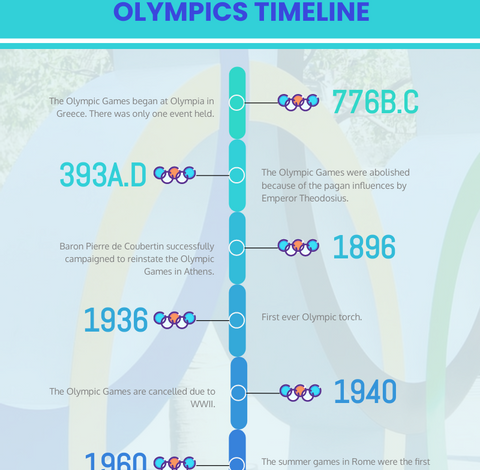Olympics Games History And Timeline.

The Olympic Games originated in ancient Greece around 776 BC. They were revived in modern times in 1896.
The Olympic Games have a rich history dating back over 2,700 years. Ancient Greeks held the first Olympics in Olympia to honor Zeus. These games featured various athletic competitions and were a significant cultural event. The modern Olympics, revived by Baron Pierre de Coubertin, began in Athens in 1896.
They aim to promote peace and unity through sports. Today, the Olympics occur every four years, alternating between summer and winter events. Athletes from around the world compete, showcasing their talents and fostering international camaraderie. The Olympic Games continue to inspire and unite people across the globe.
Ancient Origins
The Olympic Games have a rich history that dates back to ancient Greece. The origins of these games are fascinating and rooted in mythology and religious practices. The ancient Olympics were held in Olympia, Greece, and were a crucial part of Greek culture.
Early Competitions
The first recorded Olympics took place in 776 BC. These games were much simpler than today’s elaborate events. The early competitions included only a few sports.
- Running
- Wrestling
- Pankration (a form of martial arts)
Athletes competed in these events to honor the gods, especially Zeus. Winners received wreaths made of olive leaves, a symbol of peace and victory.
Cultural Significance
The ancient Olympics were more than just sports competitions. They held significant cultural and religious importance.
| Aspect | Details |
|---|---|
| Religious | Dedicated to Zeus, involved rituals and sacrifices |
| Social | Gathering of Greek city-states, fostering unity |
| Economic | Boosted local economy through tourism and trade |
People from different Greek city-states came together, promoting unity and peace. The games were also a chance for artists to showcase their talents. Poets, sculptors, and musicians performed, making the event a cultural festival.
The ancient Olympics set the foundation for the modern games. Their influence is still evident in today’s Olympic traditions and values.
Credit: www.researchgate.net
Modern Revival
The modern revival of the Olympics brought new energy to sports. It started in the late 19th century. This revival aimed to unite athletes worldwide.
Pierre De Coubertin’s Vision
Pierre de Coubertin was a French educator and historian. He had a bold vision for the Olympics. He wanted to create an international sports event. His dream was to promote peace and friendship among nations.
Coubertin believed sports could foster mutual understanding. He was inspired by the ancient Greek Olympics. He saw the potential to revive this grand tradition for modern times.
First Modern Games
The first modern Olympic Games took place in 1896. Athens, Greece, hosted these historic games. Athletes from 14 countries participated.
| Year | Host City | Participating Countries |
|---|---|---|
| 1896 | Athens | 14 |
The event featured nine sports. These included athletics, cycling, and swimming. The games were a huge success. This success marked the beginning of a new Olympic era.
Since then, the Olympics have grown. They now include hundreds of events and attract athletes from all over the world.
- Athletics
- Cycling
- Swimming
- Gymnastics
- Wrestling
The modern Olympics continue to inspire. They celebrate human achievement and bring people together.
Key Milestones
The Olympic Games have a rich history spanning over a century. The event has evolved significantly since its inception. This section highlights the key milestones that shaped the Olympics.
Major Events
The Olympics began in 1896 in Athens, Greece. It was a major milestone in sports history. The first Winter Olympics took place in 1924 in Chamonix, France. The 1936 Berlin Olympics introduced the torch relay. This became a tradition for all future Games.
World War II caused the cancellation of the 1940 and 1944 Olympics. The Games resumed in 1948 in London, symbolizing peace. The 1960 Rome Olympics saw the first live TV broadcast. This brought the Games to a global audience.
Women first competed in the 1900 Paris Olympics. The 2012 London Olympics had equal gender representation. The 2020 Tokyo Olympics were postponed to 2021 due to COVID-19.
Notable Athletes
The Olympics have seen many legendary athletes. Jesse Owens won four gold medals in 1936. His victory challenged racial barriers. Mark Spitz won seven gold medals in swimming in 1972.
Carl Lewis dominated track and field in the 1980s. He won nine gold medals over four Olympics. Nadia Comaneci scored the first perfect 10 in gymnastics in 1976.
Usain Bolt became the fastest man in 2008. He holds three world records. Michael Phelps is the most decorated Olympian with 23 gold medals.

Credit: discover.sportsengineplay.com

Credit: www.pinterest.com
Frequently Asked Questions
What Is The Origin Of The Olympics?
The Olympics originated in ancient Greece around 776 BC.
When Did The Modern Olympics Begin?
The modern Olympics began in 1896 in Athens, Greece.
How Often Are The Olympic Games Held?
The Olympic Games are held every four years.
What Are The Main Olympic Sports?
Main Olympic sports include athletics, swimming, gymnastics, and soccer.
Conclusion
The history of the Olympic Games is both rich and fascinating. From ancient Greece to the modern era, it showcases human achievement. Each timeline milestone highlights the evolution of this global event. Understanding its past helps us appreciate the spirit of unity and competition.
The Olympics continue to inspire people worldwide.

